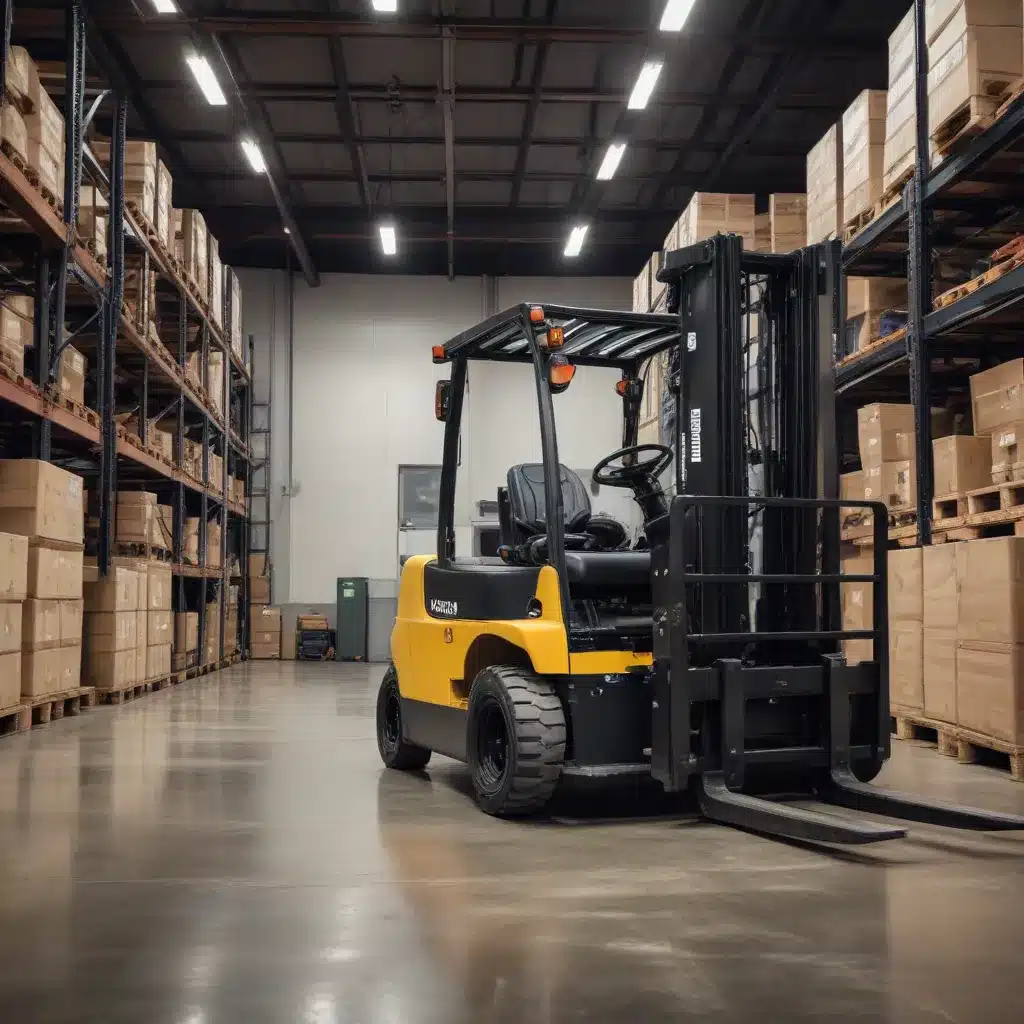
The Importance of Forklift Maintenance
Forklifts are the workhorses of warehouses, distribution centers, and industrial facilities, playing a crucial role in the efficient movement of goods and materials. However, like any other piece of machinery, forklifts require regular maintenance to ensure they operate at peak performance and maximize their lifespan. Proper forklift maintenance is not only essential for safety but also directly impacts the overall productivity and profitability of your operation.
Maintaining Forklift Efficiency
Regularly scheduled maintenance tasks, such as inspecting and lubricating moving parts, checking fluid levels, and replacing worn components, help keep forklifts running smoothly. By addressing minor issues before they become major problems, you can minimize downtime and maximize the uptime of your forklift fleet. This translates to faster material handling, reduced delays, and more efficient workflows throughout your facility.
Enhancing Forklift Safety
Forklift safety is paramount, and well-maintained equipment plays a crucial role in preventing accidents and protecting operators. Regular inspections and maintenance ensure that critical safety features, such as brakes, steering, and load handling mechanisms, are functioning correctly. This helps to mitigate the risk of accidents, which can lead to costly injuries, damaged goods, and regulatory non-compliance.
Extending Forklift Lifespan
Adhering to the manufacturer’s recommended maintenance schedule can significantly extend the lifespan of your forklifts. By proactively addressing wear and tear, you can avoid premature component failure and costly repairs. This, in turn, reduces the need for frequent forklift replacements, allowing you to maximize the return on your investment in material handling equipment.
The Rise of Hybrid Forklift Power Solutions
As the industry continues to evolve, the demand for more efficient and environmentally-friendly forklift solutions has grown. One significant advancement in this area is the emergence of hybrid power systems, which combine the benefits of electric and internal combustion engines.
Balancing Efficiency and Emissions
Hybrid forklift power solutions offer a unique balance between efficiency and emissions reduction. By leveraging both electric and combustion-based propulsion, these forklifts can deliver the power and performance required for demanding applications while significantly reducing fuel consumption and greenhouse gas emissions compared to traditional internal combustion models.
Improved Flexibility and Versatility
Hybrid forklifts provide enhanced flexibility, allowing operators to choose the most appropriate power source for the task at hand. In indoor environments or areas with strict emissions regulations, the electric mode can be utilized for clean, quiet operation. When tackling heavier loads or longer-distance hauling, the combustion engine can be engaged to provide the necessary power and runtime.
Reducing Total Cost of Ownership
The initial investment in a hybrid forklift may be higher than a traditional model, but the long-term benefits can outweigh the upfront cost. Hybrid forklifts often have lower fuel and maintenance costs, as well as extended component lifespans, which can significantly reduce the total cost of ownership over the lifetime of the equipment.
Sustainability and Environmental Responsibility
As businesses strive to reduce their carbon footprint and meet sustainability goals, hybrid forklift solutions offer a practical and impactful way to contribute to these efforts. By lowering emissions and energy consumption, hybrid forklifts help organizations demonstrate their commitment to environmental responsibility and position themselves as leaders in sustainable material handling practices.
Optimizing Forklift Maintenance for Hybrid Power Solutions
When maintaining hybrid forklift systems, it is essential to follow the manufacturer’s recommended service intervals and procedures. This includes:
Dual Power System Inspection
Regularly inspecting both the electric and combustion engine components is crucial to ensure the seamless integration and optimal performance of the hybrid power system. This may include checking battery health, monitoring fluid levels, and evaluating the condition of the hybrid-specific parts.
Specialized Maintenance Training
Technicians responsible for maintaining hybrid forklifts may require additional training to understand the unique characteristics and troubleshooting methods for these advanced power systems. Investing in this specialized knowledge helps ensure that maintenance is performed correctly and efficiently.
Adaptable Maintenance Schedules
Due to the dual-mode nature of hybrid forklifts, maintenance schedules may need to be tailored to account for the usage patterns and environmental factors that impact both the electric and combustion components. Regularly reviewing and adjusting the maintenance plan can help optimize forklift uptime and performance.
Partnering with Authorized Service Providers
Collaborating with manufacturers or authorized service providers that specialize in hybrid forklift maintenance can be beneficial. These partners can offer expertise, access to genuine parts, and comprehensive service packages to keep your hybrid fleet running at its best.
By prioritizing forklift maintenance and embracing the advantages of hybrid power solutions, businesses can achieve a level of efficiency, emissions reduction, and sustainability that was previously unattainable. This holistic approach to material handling not only enhances operational performance but also aligns with the growing demands for environmentally conscious practices in the industry.
Conclusion
Maintaining forklifts is a crucial aspect of ensuring safety, productivity, and cost-effectiveness in material handling operations. By adhering to recommended maintenance schedules and embracing the benefits of hybrid power solutions, businesses can maximize the efficiency, longevity, and environmental impact of their forklift fleets.
As the industry continues to evolve, the combination of diligent forklift maintenance and the adoption of innovative hybrid technologies will be a driving force in shaping the future of material handling. By investing in this holistic approach, organizations can position themselves for long-term success, meeting the demands of an increasingly sustainable and competitive marketplace.
To learn more about forklift maintenance best practices and explore the latest hybrid power solutions, visit https://www.forkliftreviews.com/. Our team of industry experts is dedicated to providing the insights and guidance you need to optimize your material handling operations.

